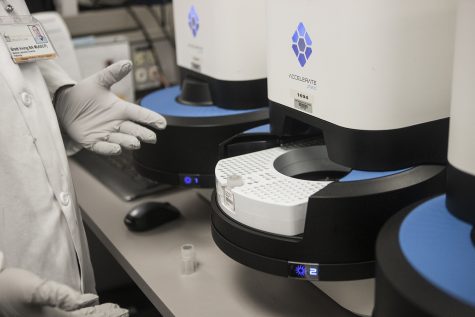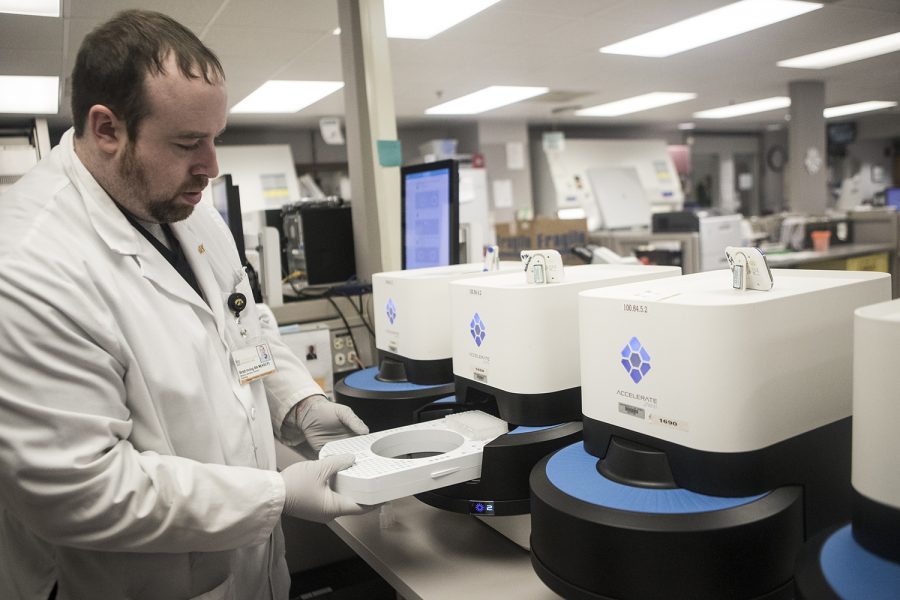UIHC invites in new sepsis treatment
UIHC is among the first institutions in the U.S. to adopt the Accelerate Pheno, a machine that will speed up the diagnosis and treatment of sepsis.
The Accelerate Pheno, a new technology that diagnoses Sepsis, is seen in a lab at the University of Iowa Hospitals and Clinics on Tuesday, January 22, 2019. Lab scientist Brett Irving demonstrates how to use the technology.
January 23, 2019
An immune reaction to an infection that could be viral, could be bacterial, and could be in any organ system in the body, sepsis is a life-threatening illness of the blood that is classically difficult to diagnose and to treat.
However, the University of Iowa Hospitals & Clinics is now one of the primary hospitals across the nation to adopt the Accelerate Pheno, a new technology that speeds up the process of sepsis diagnosis and treatment.
“We have kind of a jump on most of the country, and all of Iowa buying these,” said Bradley Ford, a UI clinical associate professor of pathology. “There’s been an overuse of antibiotics, but what this particular case does is bacteria are treated faster than having to figure out what to use.”
In the past, Ford said, physicians had to grow the bacteria, identify the bacteria, and then figure out what drugs that the bacteria were susceptible to.
“Now, we take material directly from the positive bottle, put it in the Accelerate Pheno, and it’s a single push of the button operation,” Ford said. “It’s really just a bread box-sized box.”
The most interesting aspect of the Accelerate Pheno, which he compared to a rice-cooker model, is that it’s internalized and microscopic, so results come faster than they have traditionally, he said.

The Accelerate Pheno, a new technology that diagnoses Sepsis, is seen in a lab at the University of Iowa Hospitals and Clinics on Tuesday, January 22, 2019. Lab scientist Brett Irving demonstrates how to use the technology.
“Putting out results faster is really a wonderful revolutionary thing,” Ford said. “We certainly hope to lead the way with new techniques and publish how they work, so sepsis will be treated appropriately in the future.”
The Accelerate Pheno is a team effort as much as the instrument, he said. The team whose job it is to help get patients on the most correct and targeted drugs are the foot soldiers in fighting sepsis, he said.
Dilek Ince, a UI clinical associate professor of internal medicine, agreed, noting that the stewardship team, pharmacists trained in infectious diseases, microbiology researchers, and physicians are required to apply the Accelerate Pheno.
“Our part is to provide the best care for our patients in a timely manner and decrease mortality,” she said. “By keeping them on broad-spectrum antibiotics for long periods of time, we can decrease their length of stay and admissions.”
A major concern in sepsis treatment is trying to prevent the development of resistance to antibiotics, Ince said, so the bacterial infection needs to be identified as soon as possible and the patients administered the appropriate medicine.
RELATED: New UIHC CEO addresses achievements, issues for hospital
“With this technology, we are getting the name of the bacteria after about 24 hours and a list of antibiotics that would be effective against it,” she said. “So this is a huge advantage for us.”
Ince and the rest of her team take the initial infection of patients seriously, because that’s what can evolve into sepsis.
Mercy Hospital Director of Quality Lori Bracken said a lack of treatment for patients’ sepsis can cause impaired blood flow, damaged organs, and, possibly, death.
“One of the keys for sepsis is recognizing it early,” she said. “I think at every institution, time is critical. It’s important to try to shorten the amount of time a patient presents symptoms and to treat quickly.”






